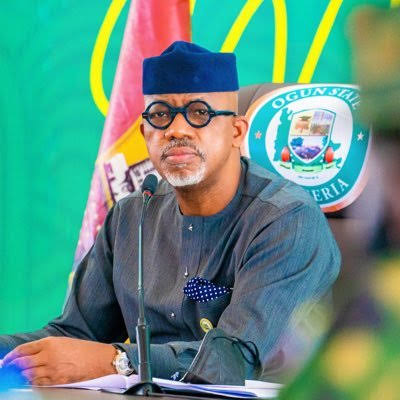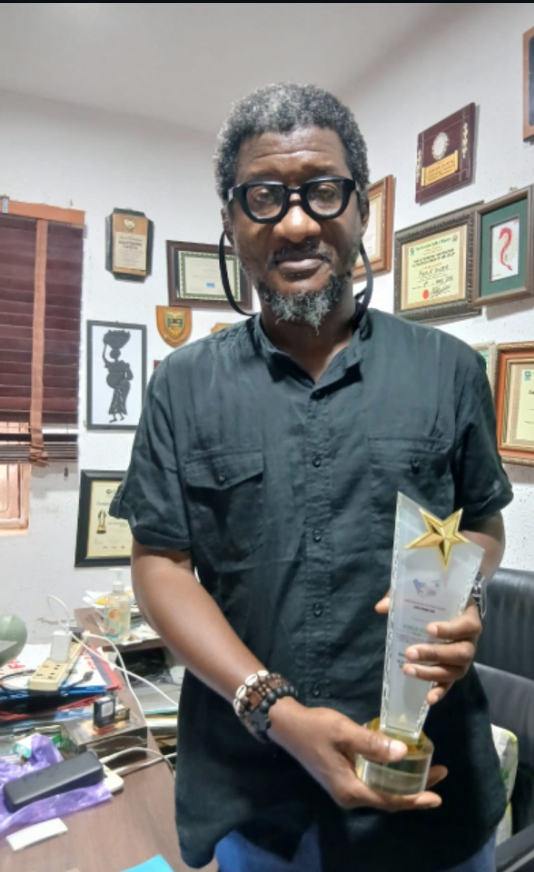celebrity radar - gossips
8 Reasons Ogun State Should Be Happy for Re-electing Dapo Abiodun as Governor By Gbolahan Adetayo

8 Reasons Ogun State Should Be Happy for Re-electing Dapo Abiodun as Governor By Gbolahan Adetayo
The re-election of Prince Dr. Dapo Abiodun (MFR) as governor is a great victory for the people of Ogun State. Governor Abiodun’s visionary leadership and commitment to the development of the state have earned him the trust and confidence of the people. Here are 8 reasons why Ogun State should be happy for re-electing Governor Abiodun:
1. CONTINUED VISIONARY LEADERSHIP:
Governor Abiodun’s re-election is a victory for the people of Ogun State who will continue to benefit from his visionary leadership.
2. UNIQUE POSITION FOR POSITIVE CHANGE:
Governor Abiodun is a right-hand man of President-elect, Asiwaju Bola Hammed Tinubu and is in a unique position to bring about positive change to the state, judging from the revelation which came to all Nigerians during the “Eleyi Of Ogun State” and “Emi Lo Kan” saga, if you get the drift.
3. IMPACTFUL PROJECTS IN FIRST TERM:
During his first term, Governor Abiodun embarked on various projects that have positively impacted the lives of the people of the state.
4. PROMISE FOR MORE DEVELOPMENT:
Governor Abiodun has promised to do even more for the people of Ogun State in his second term.
5. APPROVAL OF PROJECTS NOT APPROVED BY PRESIDENT BUHARI:
With President-elect Tinubu’s support, Governor Abiodun will be able to secure the necessary approvals for projects that were probably not approved by President Buhari due to his non-Southwest background.
6. EXPECTATION OF MORE DEVELOPMENT PROJECTS AND IMPROVED INFRASTRUCTURE:
The people of Ogun State can expect to see more development projects, improved infrastructure, and a boost in the state’s economy in the coming years.
7. TESTAMENT TO LEADERSHIP QUALITIES:
Governor Abiodun’s re-election is a testament to his leadership qualities, his commitment to transparency and accountability, and his ability to work with people from different backgrounds to achieve common goals.
8. DEDICATED TO THE WELFARE OF THE PEOPLE:
Governor Abiodun is a true servant leader who is dedicated to the welfare of his people.
In conclusion, Governor Abiodun’s re-election is a positive development for Ogun State. With his accomplished first term and promises for more development, combined with his relationship with President-elect Tinubu, the people of the state can expect great things in the coming years. Abiodun’s visionary leadership and dedication to the welfare of his people will undoubtedly take Ogun State to greater heights.
celebrity radar - gossips
Laffmattazz with Gbenga Adeyinka & Friends Returns In 2026, As Canada Joins Tour

Laffmattazz with Gbenga Adeyinka & Friends Returns In 2026, As Canada Joins Tour
Nigeria’s longest-running and most consistent comedy tour, LaffMattazz with Gbenga Adeyinka & Friends, has officially announced its 2026 tour themed “Next Chapter.” The upcoming edition marks a major milestone as the brand celebrates its 15th edition with a bold expansion that includes Canada for the first time.
The Next Chapter edition represents a clear evolution from previous years — signaling growth, global reach, and a renewed creative vision. While past editions focused on taking premium comedy experiences across Nigerian cities, the 2026 tour elevates the brand with international exposure, upgraded production, and stronger engagement with audiences at home and in the diaspora.
Speaking on the significance of the new theme, organizers describe the 15th edition as more than a celebration of longevity, but a statement of intent — positioning LaffMattazz as a global Nigerian entertainment export.
CONFIRMED TOUR CITIES & VENUES
•Ibadan – Jogor Center (Easter Sunday, April 5th, 2026)
•Akure – The Dome International Culture & Event Center
•Abeokuta – OOPL Marquee
•Lagos – Balmoral Convention Center
•Canada – Multi-city tour (dates to be announced)
Audiences can expect a rich blend of comedy, music, and surprise guest appearances — delivered with the signature “& Friends” experience that has defined the tour for over a decade.
With the Next Chapter, LaffMattazz reinforces its legacy while opening new doors for African comedy on the global stage.
celebrity radar - gossips
Kevin David Kaydee Releases Inspiring Single “Oluwa Settle Me”

Kevin David Kaydee Releases Inspiring Single “Oluwa Settle Me”
Rising music artist Kevin David Kaydee has released a powerful new single titled Oluwa Settle Me, a soulful Afro-inspired anthem that blends heartfelt prayer with modern rhythm.
“Oluwa Settle Me” captures the everyday cry of many believers seeking breakthrough, peace, and divine favour. With emotionally rich melodies and uplifting instrumentation, the song expresses a sincere plea to God for complete answers to life’s pressing questions—career, destiny, relationships, and spiritual fulfilment.

Drawing from Afrocentric sounds and contemporary gospel influences, the track stands out for its simplicity, sincerity, and spiritual depth. Kevin David Kaydee delivers the message with passion, creating a worshipful atmosphere that resonates across age groups and cultures.
The song’s message of hope and dependence on God positions it as more than just music,it is a prayer set to melody. By fusing spirituality with modern lifestyle rhythms, “Oluwa Settle Me” reflects the growing wave of gospel music that speaks directly to real-life struggles while pointing listeners back to faith.
As gospel music continues to evolve across Africa and beyond, Kevin David Kaydee’s latest release reinforces music as a powerful tool for encouragement, reflection, and spiritual connection.
“Oluwa Settle Me” is now gaining attention among gospel music lovers for its relatable message and soulful sound, marking another significant step in the artist’s growing musical journey.
celebrity radar - gossips
Another Feather for Nollywood Icon Fidelis Duker

**Another Feather for Nollywood Icon Fidelis Duker
*Lagos, Nigeria* — In a remarkable celebration of artistic achievement, renowned Nollywood figure Fidelis Duker received yet another prestigious accolade last weekend, solidifying his role as a key player in the growth of the Nigerian and African film industries. The award was presented in a ceremony held at Duker’s Lagos office by esteemed film and theatre director, Mr. Alex Eyengho, founder of the Warri International Film Festival, alongside Marketing and Strategy Director, Mrs. Matel Eyengho.
The recent recognition builds upon Duker’s previous achievement at last year’s ECOFEST in Dakar, where he was honored with a Lifetime Achievement Award. This latest accolade is a testament to his unwavering dedication and substantial contributions to the cinematic landscape.
“I am truly humbled by this recognition,” Duker expressed during the event. In his speech, Alex Eyengho lauded Duker’s pioneering efforts in establishing significant film festivals in Nigeria, particularly the Abuja International Film Festival, which has played a vital role in promoting local talent and storytelling.
Eyengho emphasized, “Fidelis has not only paved the way for emerging filmmakers but has also helped elevate Nigerian cinema on the global stage. His creative vision and commitment inspire all of us in the industry.”
As Duker reflects on this honor, he acknowledges the importance of teamwork and collaboration in achieving success. “This acknowledgment reaffirms to my team and me that our work is being observed, and it motivates us to continue contributing to the development of our sector,” he stated.
With numerous projects on the horizon, Duker remains a relentless advocate for the growth and recognition of African cinema. His latest recognition is yet another testament to the vibrant and evolving landscape of Nollywood, as industry leaders like him continue to inspire future generations.
As the film industry anticipates the next phase of development, Duker’s continued influence signals a promising future for filmmakers in Nigeria and across the continent.
-

 celebrity radar - gossips6 months ago
celebrity radar - gossips6 months agoWhy Babangida’s Hilltop Home Became Nigeria’s Political “Mecca”
-

 society5 months ago
society5 months agoReligion: Africa’s Oldest Weapon of Enslavement and the Forgotten Truth
-

 society6 months ago
society6 months agoPower is a Loan, Not a Possession: The Sacred Duty of Planting People
-

 news6 months ago
news6 months agoTHE APPOINTMENT OF WASIU AYINDE BY THE FEDERAL GOVERNMENT AS AN AMBASSADOR SOUNDS EMBARRASSING









